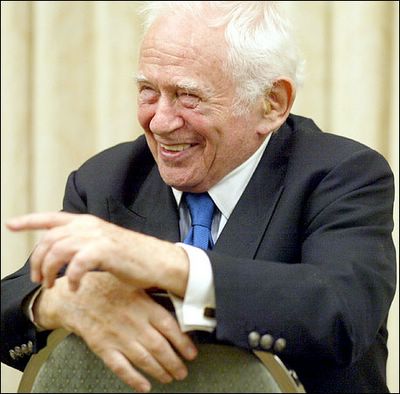My View From Las Vegas
Friday, April 29, 2005

Robert Spencer for The New York Times
Mr. Mailer said his choice of the University of Texas drew on attachments from his wartime experiences
April 25, 2005
Mailer's Miscellany
By DOUGLAS BRINKLEY
For more than five decades, Norman Mailer has been analyzing, prodding and assaulting American culture, not only in his many books, articles and screenplays but also in about 25,000 letters, all saved as carbon copies and on computer disks. And beginning in Mr. Mailer's earliest years as a writer, his mother, Fannie, relentlessly squirreled away his notebooks, family photographs, canceled checks, sales receipts and even his dogs' identification tags.
"She was formidable when it came to compiling scrapbooks," Mr. Mailer's authorized biographer, Dr. Robert Lucid, said in a phone interview. "Her view was anything that emanated from Norman had value."
Always trust a mother's instincts: on Thursday, Mr. Mailer will be in Austin, Tex., to announce the sale of his archives to the Harry Ransom Humanities Research Center at the University of Texas for $2.5 million. Stored in nearly 500 boxes weighing more than 20,000 pounds, the trove includes all manner of Mailerabilia dating back to his childhood and especially his early years at Harvard (class of '43), where he majored in aeronautical engineering and wrote an unpublished novel, "No Percentage."
When asked by e-mail how it felt to crate up his life, Mr. Mailer, now 82 and living in Provincetown, Mass., said: "I have nine children. It does remind one a bit of sending them off to college."
Glenn Horowitz, a New York bookseller who brokered the sale, said: "The time has come to acknowledge Norman's profound accomplishment. His papers need to be used by scholars. With the natural aging process the handoff was inevitable."
Mr. Mailer cited several reasons for choosing the University of Texas, including a strong bond he forged with his fellow soldiers, many of them from Texas, in the South Pacific during World War II.
"I went overseas from a Ft. Bragg artillery training unit to Leyte, where I was assigned to the 112th Cavalry," Mr. Mailer said in his e-mail. "They had been stripped of their horses, becoming, in effect, infantry. In that outfit, I learned a good bit about Texas and Texans, so that may have been a factor in choosing the University of Texas.
"However, despite a few sentimental and cultural attachments to the state, the largest part of my decision grew out of the fact that the Ransom Center at the University of Texas has one of the finest, if not the finest, collections of American literary archives in the world."
The center, founded in 1957, recently acquired the papers of several prominent writers, including James Jones, Don DeLillo, Isaac Bashevis Singer and Leon Uris. And in 2003 the university acquired the Woodward-Bernstein Watergate papers for $5 million.
"Our goals are clear," said Thomas F. Staley, director of the Ransom Center. "As we approach our 50th anniversary, we continue to keep acquiring the major writers of the 20th century like Arthur Miller and Tennessee Williams in playwriting, and now Norman Mailer in everything."
Back in 1968, Mr. Mailer's mother, who died in 1985, aided by Dr. Lucid, then teaching at the University of Pennsylvania, rented space in a Midtown Manhattan high-rise to store her son's ballooning archives.
"It was pretty stark," Dr. Lucid said. "The facility was just a light bulb with a cage around it. Norman was writing like mad and it was a race just to keep up with him."
Tucked away in the cartons are more than 100 combat letters Mr. Mailer wrote to his first wife, Beatrice Silverman, which formed the backbone of his first published novel, "The Naked and the Dead."
Then there is intellectual jousting with Robert Lowell on Vietnam, Marshall McLuhan on the media, Joan Didion on literature and James Baldwin on civil rights.
But Mr. Mailer was also fond of engaging the public, battling with harsh critics and slavish admirers alike. "Norman treated fans like V.I.P.'s, challenging their assumptions or embracing their original ideas," Dr. Lucid said. "He mixed it up equally with everybody."
By the time Mr. Mailer wrote "The Executioner's Song" (1979), generating 23 boxes worth of research materials about the convicted killer Gary Gilmore, he had outgrown his Manhattan storage space. In the early 1990's the trunks were shipped to West Pittston, Pa., where Dr. Michael Lennon, an English professor at Wilkes University in Wilkes-Barre, Pa., began cataloging them.
"He and Dr. Robert Lucid convinced me of the need for an archive," Mr. Mailer said. "If it weren't for Mike Lennon and Bob Lucid, my papers would be moldering in cartons on a wet cellar floor."
Dr. Lennon, a friend and executor of Mr. Mailer's estate, called Mr. Mailer a "string-saver." According to Dr. Lennon, the archive is brimming with literary oddities: a dozen finished screenplays, including one about the Civil War general Dan Sickles; French aviation scrapbooks; mail Mr. Mailer received during his stay at the Bellevue Hospital Center, where he had been committed for stabbing his second wife; observations on New York graffiti art; and copies of C.I.A. intelligence reports he used in researching his 1991 novel "Harlot's Ghost."
The archive also includes Mr. Mailer's notes on the presidential campaigns of Henry Wallace, John F. Kennedy and George McGovern, among other candidates, and there are cartons of documents related to his run for mayor of New York in 1969. Mr. Mailer also kept thick files on icons like Muhammad Ali, Lee Harvey Oswald and Marilyn Monroe.
"Scholars writing on recent America will need to make a pilgrimage to Austin," Mr. Horowitz, the bookseller, said. "You name the person - Neil Armstrong or Robert Kennedy or Pablo Picasso - and Mailer wrote about them."
Copyright 2005 The New York Times Company | Home | Privacy Policy | Search | Corrections | RSS | Help | Back to Top

